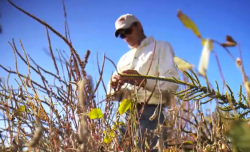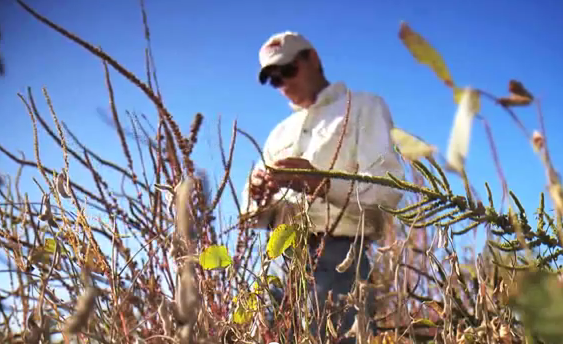
A still from a promotional video (see below) for the herbicide 2,4-D, which is being marketed as a solution for "superweeds" (picured), which have grown tolerant to other herbicides.
A new coalition is trying to throw sand in the gears of industrial agriculture’s chemical treadmill. And this one just may have what it takes to slow it down. I’m referring to the fight over USDA approval for Dow AgroScience’s new genetically modified corn seeds (brand name “Enlist”), which are resistant to the herbicide 2,4-D.
This is part of biotech’s “superweed” strategy, by which they hope to address the fact that farmers across the country are facing an onslaught of weeds impervious to the most popular herbicide in use, Monsanto’s glyphosate or RoundUp (and in some cases impervious to machetes as well!). Of course, this is a problem of the industry’s own making. It was overuse of glyphosate caused by the market dominance of Monsanto’s set of glyphosate-resistant genetically engineered seeds that put farmers in this fix in the first place.
One of the older herbicides, 2,4-D is a pretty nasty chemical — it’s been linked to cancer, neurotoxicity, kidney and liver problems, reproductive effects, and shows endocrine disrupting potential — which is one of the many reasons farmers prefer the more “benign” glyphosate. In fact, on the basis of the scientific evidence, especially related to human cancers, the Natural Resources Defense Council (NRDC) petitioned the Environmental Protection Agency (EPA) several years ago to withdraw its approval for 2,4-D. Earlier this month, the petition was summarily denied.
So it’s interesting to see this new coalition’s opposition to 2,4-D getting so much traction so quickly. Perhaps it’s because the group — dubbed Save Our Crops — isn’t made up of environmentalists and sustainable agriculture types, but rather Midwestern and Mid-Atlantic conventional farmers and large food processors (and Organic Valley, the organic co-operative organization which is both a producer and a processor).
The basis of their concern isn’t so much the health effects, but the fact that their farms may end up as collateral damage from the increase in the use of 2,4-D that will occur if Dow’s seed is approved. After all, the use of glyphosate went through the roof once Monsanto’s RoundUp Ready seeds took over the marketplace. These farmers expect 2,4-D to follow the same path. (Rodale News estimates a 60 to 80 percent increase.)
The problem has to do with pesticide drift — an issue with many pesticides, but a particular problem with 2,4-D, which unlike glyphosate is highly volatile. While its volatility was in one context considered a strength, at this point even Dow itself acknowledges that it’s a concern. In an article on the battle over the new seed’s approval, The New York Times offers an illustration of what these farmers have to fear:
To Jody Herr, it was a telltale sign that one of his tomato fields had been poisoned by 2,4-D, the powerful herbicide that was an ingredient in Agent Orange, the Vietnam War defoliant.
“The leaves had curled and the plants were kind of twisting rather than growing straight,” Mr. Herr said of the 2009 incident on his vegetable farm in Lowell, Ind. He is convinced the chemical, as well as another herbicide called dicamba, had wafted through the air from farms nearly two miles away.
As explained by Rodale News, 2,4-D-resistant plants will alter the way farmers use the chemical, encouraging them to apply it later in the season to more kill weeds (you normally wouldn’t apply a herbicide on a field full of mature plants). This fact makes it particularly problematic since, as Rodale News put it:
… not only are humidity and temperatures higher, but also neighboring tomato plants are leafing out, making them most susceptible to the drift. If the chemicals don’t outright kill plants like tomatoes, potatoes, eggplants, peppers, and other favorites, they could cause severe twisting and other deformities to occur as the plants in the drift’s path grow, rendering the harvest useless.
Which is just what farmer Herr saw in his field. Indeed, it is tomato farmers who may be the most at risk. Rodale also reports on a study produced by scientists at Ohio State University, which simulated the effects of 2,4-D drift on tomatoes [PDF]:
Experts found that the migrating pesticide vapors sparked late bloom, which diminishes the marketable red part of the tomato and stimulated growth of unmarketable green growth, which can’t be sold. In fact, just tiny amounts—1/300th of what was applied to field crops—caused significant field loss on neighboring tomato farms.
Ohio researchers concluded that realistic drift from corn or soy fields treated with either dicamba or 2,4-D will result in a 17 to 77 percent reduction in marketable fruit for neighboring farms and gardens.
These are, of course, estimates from a simulation. But the farmers and processors behind Save Our Crops would rather not be the guinea pigs in the real-world version of this experiment.
For its part, Dow assures the USDA that its new version of 2,4-D doesn’t have the same volatility — and the company will “urge” farmers to use the new, branded version rather than the far less expensive generic version of 2,4-D that’s been on the market for decades. How reassuring.
Indeed that’s where I get worried. If I had to guess, I suspect that the USDA will approve Dow’s new seed but with restrictions on things like planting acreage and use of recommended formulations and so on (though there’s always the chance the agency will punt the final decision until after the election). In any event, restrictions are only as good as their enforcement, and the USDA doesn’t have an inspiring track record. Farmers have routinely violated planting restrictions on GM seeds in the past — while regulators have a history of acceding to industry’s demands to reduce the restrictions rather than enforce them.
The public comment period on the 2,4-D-resistant seeds ends this Friday. According to the Center for Food Safety 365,000 people have already submitted comments to the USDA. An additional 143 farm, environmental, health, fisheries groups and companies will submit a letter to USDA Secretary Tom Vilsack expressing their opposition to the GMO seeds. Save Our Crops has also already submitted two petitions [PDF] while the consumer group Just Label It is sponsoring its own petition to protest USDA approval, so there’s still time for the public’s voice to be heard.
But the real fight appears to be between commodity farms who want a simple answer to the growing problem of superweeds and fruit and vegetable growers who don’t want to see their crops damaged as a consequence. The latter are often treated by the USDA as step-children while growers of the Big Five commodities — corn, soy, wheat, rice, and cotton — receive the overwhelming majority of federal farm subsidies.
I doubt that USDA approval of Dow’s new seed, if it comes, will be the end of the story. But it should tell us something that even some large conventional farmers are starting to get angry and scared by the direction industrial agriculture has taken.
Below is a video produced by Dow AgroScience advertising Enlist, or 2,4-D. Skip ahead to 2:35 to hear the company’s take on superweeds and to see some compelling images.



